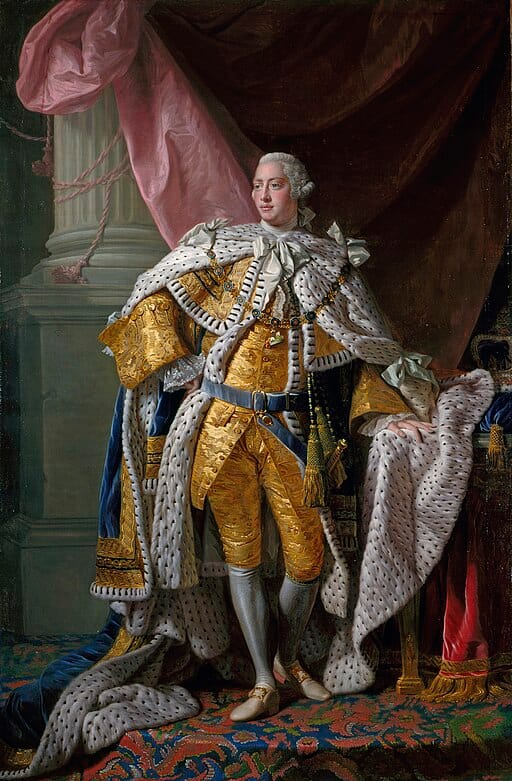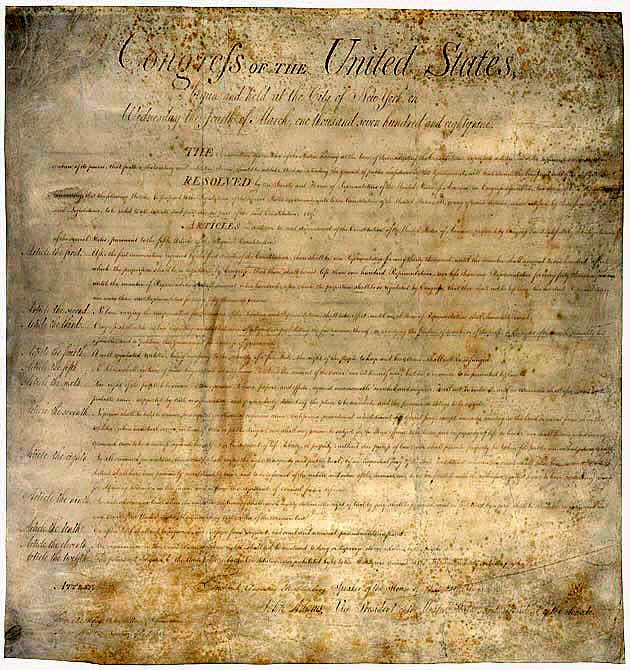King George III
What kind of king loses an entire continent yet rules for 60 years? That would be Great Britain’s King George III, whose reign saw the rise and rebellion of the American colonies.
Often branded a tyrant by revolutionaries, King George III was not simply the villain in a colonial drama. George was a complex figure ruling over an empire in flux but to the American colonists his policies symbolized unchecked power. The infamous Boston Tea Party was not just about tea but it was about defiance.
When colonists dumped 342 chests of British tea into Boston Harbor in 1773 it was a bold protest against taxation without representation. They hoped to send a message– the colonies would not be pawns in Britain’s imperial game. The Tea Act may have lowered prices but it reinforced Parliament’s control. Something freedom-hungry colonists refused to accept.
King George III saw it as rebellion but the colonists saw it as the beginning of liberty.
This dramatic act helped ignite the American Revolution. Forever linking King George III’s legacy to a struggle for independence. Misunderstood or not, his rule marked a turning point in world history.

Public domain image. Author deceased more than 70 years ago. Sourced via Wikimedia Commons. Original file.
| Attribute | Details |
| King George III Last Name | George William Frederick |
| King George III Birthday | June 4, 1738 – Norfolk House, London |
| When did King George III Die | January 29, 1820 – Windsor Castle, England |
| King George III Reign | 1760–1820 (King of GB & Ireland, then UK) |
| King George III House | Hanover |
| King George III Wife | Queen Charlotte of Mecklenburg-Strelitz |
| King George III Family Tree | George IV, William IV, among 15 total |
| Grandchildren and King George III Queen Charlotte | Queen Victoria, Princess Charlotte of Wales |
| King George III Facts | Loyal to Parliament, devout, intelligent |
| Later Life and King George III Mental Health | Suffered from recurring mental illness |
King George iii Early Life
Born on June 4, 1738 King George III was the first Hanoverian monarch born and raised in England. Fluent in English and loyal to British traditions. He ascended the throne in 1760 with deep national pride but across the Atlantic his reign took on a far different legacy.
To American colonists George III became a symbol of tyranny. Though Parliament passed the taxes like the infamous Tea Act of 1773. It was the king’s unwavering support of these laws that angered colonists. They believed he ignored their cries of “no taxation without representation.”
This frustration boiled over in Boston and on a cold December night. Patriots dumped 342 chests of British tea into the harbor–not over tea itself but over the principle. They were not just resisting taxes; they were sending a message to King George III: We will not be ruled without a voice.
The Boston Tea Party was a defiant stand against royal control. Colonists hoped to spark change, maybe even gain independence. Ironically their boldness pushed the king further into resistance, escalating tensions toward revolution.
King George III may have begun as a proud British ruler but in American memory. He became the monarch and freedom rose up against.
King George III Biography
King George III ruled during an era of explosive change from the Seven Years’ War to the Napoleonic Wars and his reign (1760–1820) witnessed the rise of Britain as a global power. Yet one of the most defining challenges of his rule was the loss of the American colonies.
In December 1773 colonists in Boston dumped 342 chests of British tea into the harbor but why would they commit such a bold act?
At the heart of the Boston Tea Party was a protest. American colonists frustrated by “taxation without representation,” King George III saw it as the symbol of British tyranny. The Tea Act of 1773 allowed the British East India Company to sell tea at lower prices, undercutting local merchants and colonists who believed this was another trick to force them to accept unfair taxes.
Did you know their message? They would no longer submit quietly, this was not just about tea but it was about freedom.
While King George III remained a constitutional monarch. With much power in Parliament’s hands he supported harsh retaliation. In response Britain enacted the Coercive Acts tightening control. Instead of submission the colonies united and the American Revolution ignited.
Despite losing the colonies George III’s reign did not end in failure. The 1800 Acts of Union created the United Kingdom of Great Britain and Ireland expanding his symbolic influence.
Still to many Americans King George III became the face of oppression and the Boston Tea Party a turning point in the birth of a nation.
George III’s reign (1760–1820) spanned some of the most turbulent chapters in world history:
- The Seven Years’ War
- The American Revolution
- The French Revolution
- The Napoleonic Wars
Madness of King George III
When American colonists dumped 342 chests of tea into Boston Harbor in 1773 they were not just protesting a tax but they were rebelling against a king. King George III was seen as the face of British tyranny and he became the target of colonial anger. His refusal to repeal the Tea Act symbolized everything the colonists despised: taxation without representation and an unyielding monarchy.
Often remembered as the “mad king,” George III’s reign was marred by personal tragedy. From the 1780s he suffered from recurring mental illness, possibly porphyria or bipolar disorder. By 1811 his son had to step in as Prince Regent. The king’s final years were spent in seclusion, blind, deaf and delusional.
Yet during his most lucid years George stood firm against colonial demands. To the American patriots his inaction and stubbornness justified bold defiance. The Boston Tea Party was their message: liberty mattered more than loyalty.
What did they hope to achieve? Autonomy. A voice in their own governance. Freedom from a ruler who neither heard nor understood them.
And so the image of King George III lives on not just as a monarch but as a symbol of the revolution he inadvertently helped ignite.
What did King George III do?
When American colonists dumped crates of British tea into Boston Harbor in 1773.They were not just protesting a tax but they were sending a message to King George III. Their bold act of defiance challenged what they saw as an unfair rule: “No taxation without representation.”
In U.S. history books he’s often cast as the villain who “lost America.” Yet the full story is far more complex.
George III ruled for 60 years as the longest reign of any English male monarch. While his policies sparked outrage across the Atlantic at his home he was admired. Nicknamed “Farmer George,” he supported agricultural innovation and scientific progress and he was also a devoted family man and married to Queen Charlotte for nearly six decades and father to 15 children.
Still his firm stance on colonial authority pushed the American colonies toward revolution. The Boston Tea Party was not just about tea but it was a rejection of imperial control and a cry for self-governance.
Ironically George III’s legacy helped shape the constitutional monarchy Britain has today, and his granddaughter, Queen Victoria, later reigned during a golden age of empire and progress.
So was King George III a tyrant or a visionary monarch caught in turbulent times?
Understanding both sides of his legacy adds depth to one of the most pivotal moments in American history.
Fact about King George III:
- He was a devoted family man, married to Queen Charlotte of Mecklenburg-Strelitz for nearly 60 years. They had 15 children, including future monarchs George IV and William IV.
- He supported advancements in agriculture and science, earning him the nickname “Farmer George” among his people.
- His granddaughter, Queen Victoria, would go on to usher in a new golden age of empire and innovation.
King George III Successor
Was he a tyrant or a tragic figure? A visionary monarch or a man overwhelmed by the pace of change?
The truth, like most history, is somewhere in between.
King George III ruled during an age of enlightenment, rebellion and global transformation. While history books often spotlight his failures especially in the colonies. They also overlook his dedication to duty, family and national pride.
King George III Quote:
“Born and educated in this country, I glory in the name of Briton.”
— King George III, upon his accession to the throne


